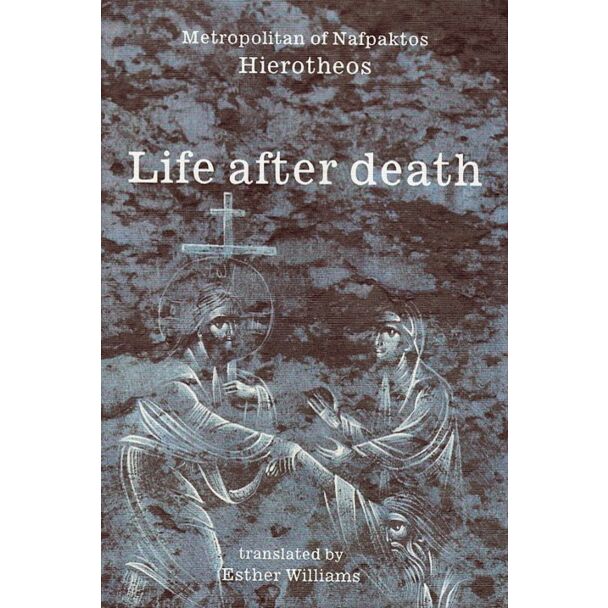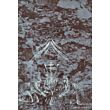Life after Death
Metropolitan of Nafpaktos Hierotheos
translated by Esther Williams
translated by Esther Williams
Publication Data: Levadia, Greece: Birth of the Theotokos Monastery, 1995
Format: softcover
Number of Pages: 391
Dimensions (l × w × h): 20.9 cm × 14.0 cm × 2.3 cm
ISBN: 960‒7070‒34‒8
Metropolitan of Nafpaktos Hierotheos
translated by Esther Williams
“When the Church speaks of death, it is not in order to frighten the people and creat panic, but to help them to overcome it. Obviously the problem of death is not easy to face in any case, nor is death a simple event. We are born corruptible and mortal. At his birth the particular person is born who is going to die. [...]In this book we shall confront some of the questions which concern people today, such as what is death, what is the soul, what happens when the soul leaves the body, where the soul goes after its separation from the body, whether a man’s being dissolves at death, what is the purifying fire, what are Paradise and Hell, what will happen at the Second Coming of Christ, and so on.”
—“Introduction”
CONTENTS
Preface to the English edition
Introduction
1
The parable of the Rich Man and Lazarus about life after death
1. The parable of the rich Man and Lazarus
2. Interpretative analysis of the parable
2
The separation of the soul from the body
1. Definition of the soul
2. The creation and genesis of the soul
3. Death and the ancestral sin
4. The mystery of the soul’s departure from the body
5. The taxing of the souls
6. The intermediate state of souls
7. The death of infants
8. Conclusions
3
Experiences after death
1. Contemporary after-death experiences
2. Critique of these experiences from an orthodox point of view
3. The discernment of experiences
4
The immortality of the soul
1. Immortality of the soul according to philosophy
2. The immortality of the soul according to orthodox theology
3. Thnetopsychism and the Orthodox Church
5
The purifying fire
1. The discussions at Ferrara-Florence about the purifying fire
2. The teaching of St. Mark Eugenicus about the purifying fire
a) Dogmatic discussion is needed
b) Paradise and Hell exist
c) There is no purifying fire
d) Theological arguments against the existence of a purifying fire
e) Interpretation of an apostolic passage
f) Patristic passages in the dialogue
g) The eternal fire is uncreated
3. What is the source of the Latins’ teaching about the purifying fire
6
The Second Coming of Christ
1. The coming of Christ in glory
2. The resurrection of the dead
3. The coming judgement
7
Paradise and Hell
1. Holy Scripture on Paradise and Hell
2. The holy Fathers on Paradise and Hell
3. Paradise and Hell in the life of the Church
4. The theological and ecclesiological consequences of this truth
8
The restoration of all things
1. Ancient philosophies and theologies about the restoration of all things
2. The views of the interpreters of the position of St. Gregory of Nyssa as to the restoration of all things
3. Interpretive commentary on the teaching of St. Gregory of Nyssa about the restoration of all things
a) His great ecclesiastical personality
b) His views about philosophy
c) His teaching about man’s choice and the perpetuity of Hell
d) Interpretive analysis of particular passages
e) Interpretation of St. Gregory of Nyssa by the Fathers of the Church
4. Conclusion
9
Eternal Life
1. The Kingdom of God
2. The renewal of creation
3. The continuing development in the age to come
10
Diachronic eschatology
1. Interpretation of the term eschatology
2. Time in the orthodox conception
3. The past and present of the last things
a) What the Kingdom of God is
b) The last things as the first
c) The last things as the present
Epilogue
The Feast of the Kingdom
Format: softcover
Number of Pages: 391
Dimensions (l × w × h): 20.9 cm × 14.0 cm × 2.3 cm
ISBN: 960‒7070‒34‒8
Metropolitan of Nafpaktos Hierotheos
translated by Esther Williams
“When the Church speaks of death, it is not in order to frighten the people and creat panic, but to help them to overcome it. Obviously the problem of death is not easy to face in any case, nor is death a simple event. We are born corruptible and mortal. At his birth the particular person is born who is going to die. [...]In this book we shall confront some of the questions which concern people today, such as what is death, what is the soul, what happens when the soul leaves the body, where the soul goes after its separation from the body, whether a man’s being dissolves at death, what is the purifying fire, what are Paradise and Hell, what will happen at the Second Coming of Christ, and so on.”
—“Introduction”
CONTENTS
Preface to the English edition
Introduction
1
The parable of the Rich Man and Lazarus about life after death
1. The parable of the rich Man and Lazarus
2. Interpretative analysis of the parable
2
The separation of the soul from the body
1. Definition of the soul
2. The creation and genesis of the soul
3. Death and the ancestral sin
4. The mystery of the soul’s departure from the body
5. The taxing of the souls
6. The intermediate state of souls
7. The death of infants
8. Conclusions
3
Experiences after death
1. Contemporary after-death experiences
2. Critique of these experiences from an orthodox point of view
3. The discernment of experiences
4
The immortality of the soul
1. Immortality of the soul according to philosophy
2. The immortality of the soul according to orthodox theology
3. Thnetopsychism and the Orthodox Church
5
The purifying fire
1. The discussions at Ferrara-Florence about the purifying fire
2. The teaching of St. Mark Eugenicus about the purifying fire
a) Dogmatic discussion is needed
b) Paradise and Hell exist
c) There is no purifying fire
d) Theological arguments against the existence of a purifying fire
e) Interpretation of an apostolic passage
f) Patristic passages in the dialogue
g) The eternal fire is uncreated
3. What is the source of the Latins’ teaching about the purifying fire
6
The Second Coming of Christ
1. The coming of Christ in glory
2. The resurrection of the dead
3. The coming judgement
7
Paradise and Hell
1. Holy Scripture on Paradise and Hell
2. The holy Fathers on Paradise and Hell
3. Paradise and Hell in the life of the Church
4. The theological and ecclesiological consequences of this truth
8
The restoration of all things
1. Ancient philosophies and theologies about the restoration of all things
2. The views of the interpreters of the position of St. Gregory of Nyssa as to the restoration of all things
3. Interpretive commentary on the teaching of St. Gregory of Nyssa about the restoration of all things
a) His great ecclesiastical personality
b) His views about philosophy
c) His teaching about man’s choice and the perpetuity of Hell
d) Interpretive analysis of particular passages
e) Interpretation of St. Gregory of Nyssa by the Fathers of the Church
4. Conclusion
9
Eternal Life
1. The Kingdom of God
2. The renewal of creation
3. The continuing development in the age to come
10
Diachronic eschatology
1. Interpretation of the term eschatology
2. Time in the orthodox conception
3. The past and present of the last things
a) What the Kingdom of God is
b) The last things as the first
c) The last things as the present
Epilogue
The Feast of the Kingdom
Write Your Own Review






